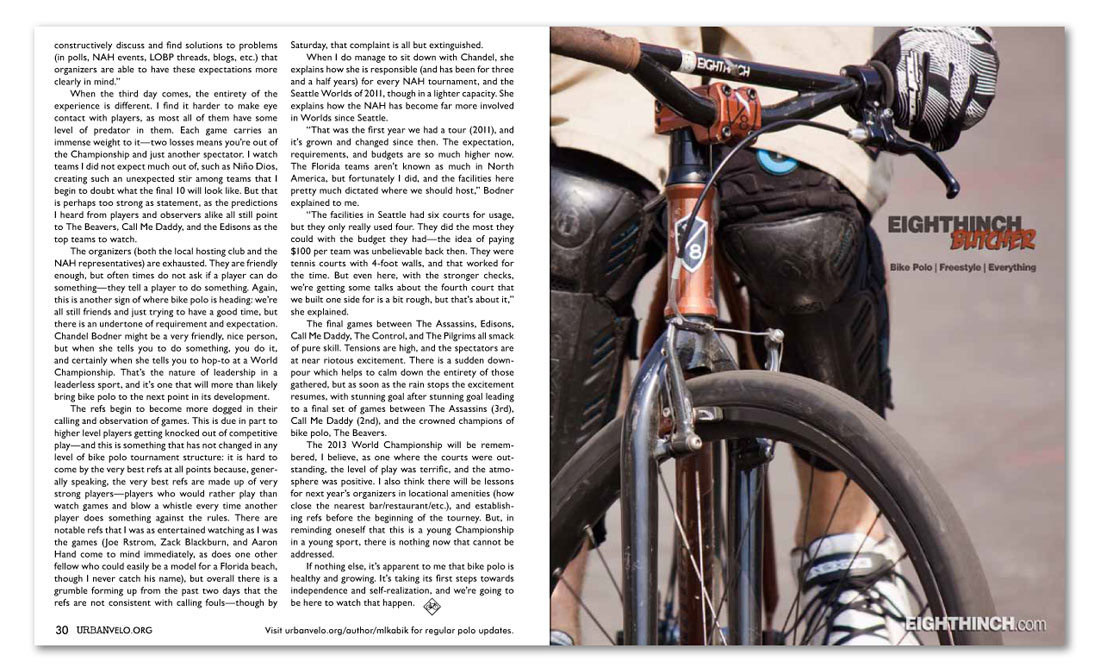


constructively discuss and find solutions to problems (in polls, NAH events, LOBP threads, blogs, etc.) that organizers are able to have these expectations more clearly in mind.”
When the third day comes, the entirety of the experience is different. I find it harder to make eye contact with players, as most all of them have some level of predator in them. Each game carries an immense weight to it—two losses means you’re out of the Championship and just another spectator. I watch teams I did not expect much out of, such as Niño Dios, creating such an unexpected stir among teams that I begin to doubt what the final 10 will look like. But that is perhaps too strong as statement, as the predictions I heard from players and observers alike all still point to The Beavers, Call Me Daddy, and the Edisons as the top teams to watch.
The organizers (both the local hosting club and the NAH representatives) are exhausted. They are friendly enough, but often times do not ask if a player can do something—they tell a player to do something. Again, this is another sign of where bike polo is heading: we’re all still friends and just trying to have a good time, but there is an undertone of requirement and expectation. Chandel Bodner might be a very friendly, nice person, but when she tells you to do something, you do it, and certainly when she tells you to hop-to at a World Championship. That’s the nature of leadership in a leaderless sport, and it’s one that will more than likely bring bike polo to the next point in its development.
The refs begin to become more dogged in their calling and observation of games. This is due in part to higher level players getting knocked out of competitive play—and this is something that has not changed in any level of bike polo tournament structure: it is hard to come by the very best refs at all points because, generally speaking, the very best refs are made up of very strong players—players who would rather play than watch games and blow a whistle every time another player does something against the rules. There are notable refs that I was as entertained watching as I was the games (Joe Rstrom, Zack Blackburn, and Aaron Hand come to mind immediately, as does one other fellow who could easily be a model for a Florida beach, though I never catch his name), but overall there is a grumble forming up from the past two days that the refs are not consistent with calling fouls—though by Saturday, that complaint is all but extinguished.
When I do manage to sit down with Chandel, she explains how she is responsible (and has been for three and a half years) for every NAH tournament, and the Seattle Worlds of 2011, though in a lighter capacity. She explains how the NAH has become far more involved in Worlds since Seattle.
“That was the first year we had a tour (2011), and it’s grown and changed since then. The expectation, requirements, and budgets are so much higher now. The Florida teams aren’t known as much in North America, but fortunately I did, and the facilities here pretty much dictated where we should host,” Bodner explained to me.
“The facilities in Seattle had six courts for usage, but they only really used four. They did the most they could with the budget they had—the idea of paying $100 per team was unbelievable back then. They were tennis courts with 4-foot walls, and that worked for the time. But even here, with the stronger checks, we’re getting some talks about the fourth court that we built one side for is a bit rough, but that’s about it,” she explained.
The final games between The Assassins, Edisons, Call Me Daddy, The Control, and The Pilgrims all smack of pure skill. Tensions are high, and the spectators are at near riotous excitement. There is a sudden downpour which helps to calm down the entirety of those gathered, but as soon as the rain stops the excitement resumes, with stunning goal after stunning goal leading to a final set of games between The Assassins (3rd), Call Me Daddy (2nd), and the crowned champions of bike polo, The Beavers.
The 2013 World Championship will be remembered, I believe, as one where the courts were outstanding, the level of play was terrific, and the atmosphere was positive. I also think there will be lessons for next year’s organizers in locational amenities (how close the nearest bar/restaurant/etc.), and establishing refs before the beginning of the tourney. But, in reminding oneself that this is a young Championship in a young sport, there is nothing now that cannot be addressed.
If nothing else, it’s apparent to me that bike polo is healthy and growing. It’s taking its first steps towards independence and self-realization, and we’re going to be here to watch that happen.